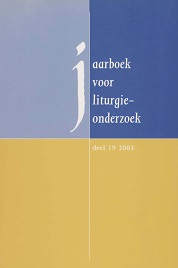De heilige Maarten Luther. Over moderne liturgiewetenschap, aan de hand van de positie van de heiligen in het werk van Gerardus van der Leeuw (1890-1950)
Abstract
The strong emphasis on anthropology in modern liturgical studies raises the question of the position of theology in the discipline. The article aims at showing how Gerardus van der Leeuw (1890-1950), one of the founding fathers of Dutch liturgical studies, dealt with this problem. He is a phenomenologist and theologian, a professor and a minister. Under the influence of modernity. Van der Leeuw tried to subsume everything in one single concept: the ‘power’, and so broadened the field of liturgical science. This ‘power’ is comparable to Rudolph Otto’s ‘das Heilige’. Liturgy, culture and religion are closely connected. In Van der Leeuw we notice a broad approach of liturgy, even though it must be remarked that for him liturgy as a discipline in the narrow sense of the word still was a dogmatic discipline. Nevertheless many cross links can be shown in his phenomenology that make it reasonable to speak of a broad understanding of liturgy. The theme of ‘saints’ is one of these cross links. Where modern research sees sacrality, it approaches it at the level of (pictorial) language, without embedding it in a more or less fixed point of reference. This safeguards the breadth Van der Leeuw measured out for the liturgical field of study. For Van der Leeuw theology gave a strong perspective and a point of reference, whereas in modern liturgical science this easily becomes invisible or merges into cultural science.


